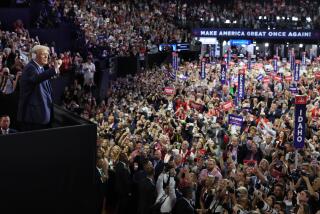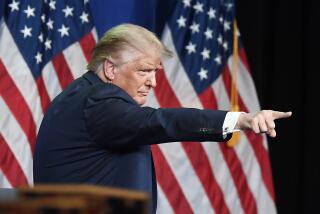Conservative leaders plan a comeback
WASHINGTON — Awaking to the dismal reality of widespread defeat, more than 100 of the conservative movement’s most ardent leaders gathered as they have every Wednesday for more than a decade in a downtown conference room to discuss strategy.
And although they had lost control of the House, where Newt Gingrich launched the “Republican revolution” 12 years ago, they showed few signs of despair.
Instead, speaker after speaker declared that voters had not rejected conservative ideas but had merely rejected Republican Party leaders who strayed from the movement’s basic values.
“There was no ideological rejection in this election,” said Richard Lessner, former executive director of the American Conservative Union, noting that the GOP’s casualties spanned the spectrum from stalwart conservatives such as Sen. Rick Santorum of Pennsylvania to moderates such as Rhode Island’s Sen. Lincoln Chafee.
“This was about the Republican Party not behaving like Republicans,” Lessner said. “And the voters gave the party a timeout and said, ‘Go stand in the corner.’ ”
On a day that President Bush and many analysts said the voters appeared to be demanding an end to the hard-line politics of division, these conservative insiders insisted they could return to power as soon as 2008 by hewing closer to their traditional course.
The group, which has met regularly in the second-floor conference room of the anti-tax group Americans for Tax Reform, represents a broad spectrum of conservative business, political and religious organizations. It has functioned as a nerve center for the movement, having come together shortly after President Clinton’s 1992 victory seemed to end the Reagan revolution of the 1980s.
What is needed now, participants in Wednesday’s session said, is reinforcement of their principles of cutting taxes and spending along with promotion of social causes such as the fights against abortion and same-sex marriage.
The star guest was Republican National Committee Chairman Ken Mehlman, who reminded participants that after losing the White House to Clinton in 1992, the movement turned its losses into the 1994 takeover of Congress.
“We have a long history as a movement, if you think about it -- of using our difficult election outcomes to make ourselves better,” Mehlman said. “The fact is, we do need to do better, and I think we need to look at it as a big opportunity as a party and a cause to return to our reformist approach and our reformist principles.”
A Republican National Committee memo laying out talking points for conservative pundits, bloggers and other supporters -- which was obtained by The Times -- underscored that message, calling for the party to “refocus conservative principles of less government, lower taxes, less regulation, strong national defense, judicial restraint and fiscal conservatism.”
The memo lauded a “strong party and a philosophy that works,” adding: “We just have to recommit ourselves to better serving the American people.”
At the same time, the conservative leaders made clear where they thought the GOP had strayed from its principles. And their criticisms underscored some long-simmering tensions within the conservative movement that foreshadowed the GOP losses -- and that will now define the soul-searching of some activists as they plot a 2008 comeback.
Several participants said the growth of government over the last 12 years -- accelerated under the Bush presidency -- had discouraged traditional supporters who had long viewed the GOP as the party of limited government.
They said money had been wasted on so-called budget earmarks for pet projects that Bush failed to veto and on White House-backed programs such as the 2003 Medicare prescription drug plan.
One election-night poll presented Wednesday illustrated that concern. It showed that more voters now considered the GOP the party of big government. The survey was commissioned by the conservative Club for Growth, whose leader said in an interview after the Wednesday meeting that the GOP’s leaders had lost their franchise.
“There’s no doubt in my mind it was not a repudiation of conservatives but it was a repudiation of the Republican Party,” said the group’s president, former congressman Pat Toomey.
For his part, meeting host Grover Norquist said in an interview that he viewed the election as a bump on an otherwise smooth road to continued conservative dominance.
That view is not shared by all conservatives, and there are bound to be recriminations and finger-pointing in the weeks ahead. But Wednesday’s meeting was an indication of the approach some influential GOP leaders plan to take to minimize such second-guessing and focus on the future.
Despite short-term setbacks, Norquist said, the conservative movement is “perfectly healthy. No one is losing because they favor tax cuts, are pro-life, pro-gun or pro-growth.
“In two years, there is no George W. Bush and almost no Iraq war as presently constructed,” Norquist said.
“And Democrats will be standing there, naked to the winds, having been forced by Nancy Pelosi to vote for tax increases, gun control and impeaching the president,” he added, referring to the future speaker of the House.
*
peter.wallsten@latimes.com
More to Read
Get the L.A. Times Politics newsletter
Deeply reported insights into legislation, politics and policy from Sacramento, Washington and beyond. In your inbox three times per week.
You may occasionally receive promotional content from the Los Angeles Times.










